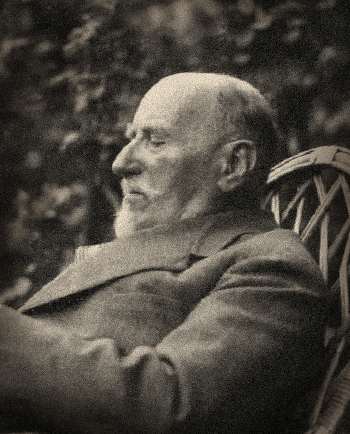
Feliks Karol Koneczny – a historian, civilisation theoretician, philosopher of history, and theatre critic. He was born on 1 November 1862 in Krakow, and he died there on 10 February 1949. After completing St Hyacinth Secondary School in Krakow in 1883, he took up studies at the Faculty of Philosophy of the Jagiellonian University where, under the supervision of professors Stanisław Smolka, Wincenty Zakrzewski and Michał Bobrzyński, he studied history. In 1888 he obtained the doctor’s degree based on the doctoral thesis “Najdawniejsze stosunki Inflant z Polską do roku 1393” [The Oldest Relations between Livonia and Poland until 1393]. As a member of the Polish Academy of Learning, in 1889–1890 he carried out research in the Vatican Archive. After coming back from Rome, he worked at the Polish Academy of Learning (until 1897).
In 1919 he was asked to become the vice professor at the Stefan Batory University in Vilnius. In 1920 he defended his postdoctoral thesis at UJ entitled “Dzieje Rosji do r. 1449” [The History of Russia until 1449], in which he presented his theory of civilisation. Then he published the book “Polskie Logos a Ethos. Roztrząsania o znaczeniu i celu Polski” [Polish Logos and Ethos: Deliberations on the Meaning and Aim of Poland] (Poznań 1921), in which, referring to the cultural heritage of Poland, he presented his own concept of history learning, the final result of which is the theory of civilisations fighting with each other. From October 1922 to 1929, as an associate professor, he directed the Department of the Eastern Europe History at the Stefan Batory University in Vilnius.
His most important works include: “Jagiełło i Witold” [Jagiełło and Witold] (Krakow 1893); “Głos w sprawie ludowej” [Voice on People’s Case] (Krakow 1896); “Dzieje Śląska” [The History of Silesia] (Bytom 1897, Warsaw 1999); “Życie i zasługi A. Mickiewicza” [A. Mickiewicz’s Life and Achievements] (Krakow 1898); “Dzieje Polski” [The History of Poland] (vol. I–II, Łódź 1902, Komorów 1997); “Dzieje Polski za Piastów” [The History of Poland during the Piast Dynasty] (Krakow 1902, Komorów 1997); “Dzieje Polski za Jagiellonów” [The History of Poland during the Jagiellonian Dynasty] (Krakow 1903); “Geografia historyczna” [Historical Geography] (Lviv 1905); “Dzieje Rosji” [The History of Russia] (vol. I: “Do roku 1449” [Before 1449], Warsaw 1917; vol. II: “Litwa a Moskwa w latach 1449– 1492” [Lithuania and Moscow between 1449–1492], Vilnius 1929; vol. III: “Schyłek Iwana III” [The Fall of Ivan III of Russia], 1492–1505, London 1984; all three volumes published in Komorów 2003; “Tadeusz Kościuszko” (Poznań 1917, 1922, Warsaw 1996); “Polskie logos a ethos. Roztrząsania o znaczeniu i celu Polski” [Polish Logos and Ethos: Deliberations on the Meaning and Aim of Poland] (vol. I–II, Poznań 1921, Komorów 1996); “Dzieje administracji w Polsce” [The History of Administration in Poland] (Vilnius 1924, Warsaw 1999); “O wielości cywilizacyj” (Krakow 1935, 1996; English version: On the Plurality of Civilizations, London 1962); “Rozwój moralności” [The Development of Morality] (Lublin 1938, Komorów 1997); “Święci w dziejach narodu polskiego” [Saints in the History of the Polish Nation] (Warsaw 1939, 1988). The following books were published after his death: “Cywilizacja bizantyńska” [Byzantine Civilisation] (London 1973); “Cywilizacja żydowska” [Jewish Civilisation] (London 1974); “O ład w historii” [For the Order in History] (London 1977, Wrocław 1993 ); “Państwo w cywilizacji łacińskiej. Zasady prawa w cywilizacji łacińskiej” [The State in Latin Civilisation. The Principles of the Law in Latin Civilisation] (London 1981; under the new title: “Państwo i prawo w cywilizacji łacińskiej” [The State and the Law in Latin Civilisation], Komorów 1997); “Prawa dziejowe” [The Laws of History] (London 1982, Komorów 2001).
Koneczny’s scientific activity focused on historical research which mainly referred to the Medieval times in Poland and Europe. For Koneczny, history as a science was a type of scientific cognition the general objective of which is truth. In this sense, learning history is a kind of cognition necessary for the proper development of culture.
According to Koneczny, civilisation is a method of a collective life system. It includes both the physical and spiritual goods which exist in human culture and which have been achieved by the man throughout the ages. Koneczny believed that in the history of humankind there were more than 20 civilisations and some of them survived until now: Latin (Western), Byzantine, Turan (of the Mongolian origin), Jewish, Arab, Brahmin and Chinese civilisation.
Koneczny claimed that the history of humankind may only be understood against the background of continually fighting civilisations. There are no syntheses between civilisations; civilisation mixtures are the main reason for world conflicts. The type of civilisation determines politics, economy, law and state, forms of family life, public life and individual life, as well as many other aspects. Among the existing civilisations, only the Latin (Western) Civilisation is based on creationism, personalism, aposteriorism, and dualism of public and private law, as a result of which it makes the man’s personal development possible. Latin civilisation is the work of the Catholic Church which educated peoples to be nations following the Gospel and Catholic ethics, and respecting truth as such.